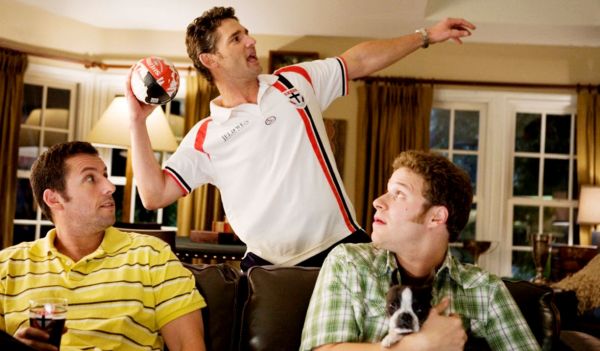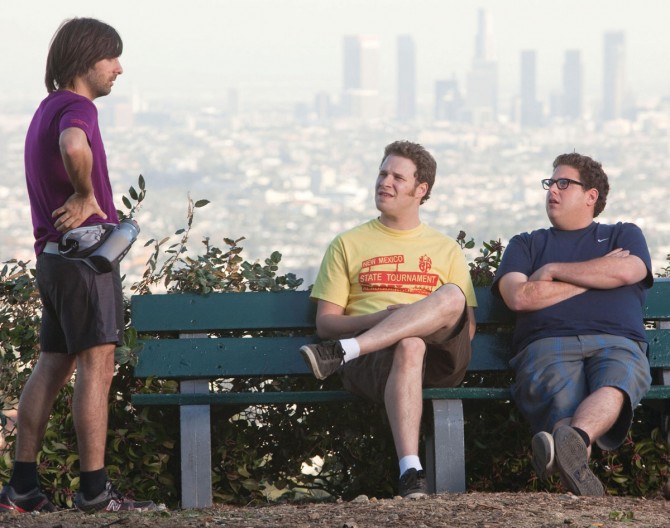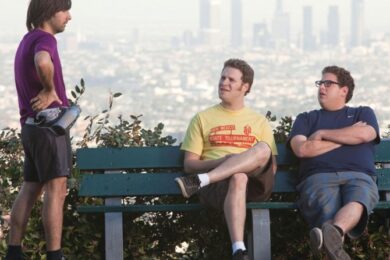“It’s a look into what we would do with an insight into our own mortality”, offers director Judd Apatow of his latest release from the stately confines of a pressroom somewhere within Claridge’s labyrinthine bowels. “I read a lot of books about businessmen who had survived serious brushes with death — it only made them more driven. I found that interesting — what if a character resisted the second chance?”
What indeed. The writer-director-producer and all round hyphenate-extraordinaire is in town to dissect his latest brocore epic, a trademark Apatowian tale of beta-male merriment fused to a more sombre ‘Oscar bait’ story of redemption in the face of terminal decline — think Terms of Endearment in reverse, with a giddy lashing of dick jokes thrown in for good measure — a dramedy in which a man staring down the barrel of middle age is suddenly forced to reconcile the life he has led and where it is headed.
Funny People’s genesis came from a freak, life-changing event in Apatow’s youth: “When the Northridge earthquake hit [Southern California, 1994], my chimney fell through the roof of my bedroom,” explains the director. “The only reason I wasn’t there was because I was outside painting the house. For about three days, I really appreciated life . . . but only for three days. Funny People is based on that idea: If you survive, do you learn anything from it that you keep using in your life?”
The film opens with grainy footage of a younger Sandler making prank phone calls in a home video shot 20-plus years ago by the director himself, when the two were roommates (“I always wanted to do this with Adam, it took a long time to work up to the challenge”, adds Apatow). The protagonist’s love interest is played by Apatow’s real-life wife Leslie Mann, whose actual pre-motherhood career is sampled as her character’s “acting reel”, and the couple’s real-life offspring also make their second appearance after Knocked Up as her onscreen daughters. Considering the personal investment Apatow has had in the production, it is perhaps unsurprising that the film clocks in at a weighty 146 minutes, with the director also admitting that there is “over six hours of extra material” earmarked for the imminent DVD release. In response to suggestions that his work is starting to favour the kind of nepotism that would make Tim Burton blush, Apatow is unabashed: “Close friendships create passionate work,” he enthuses. His cool assurance seems borne of an innate confidence in his meta-labour of love: “Now is the moment where they would let me do something like this . . . so I took full advantage." A bold move, sure, but Funny People’s greatest strength is also its biggest flaw — just because you can doesn’t always mean that you should; there’s a thin line between investment and indulgence.

The plot itself concerns George Simmons (Sandler), a stand-up-turned-movie star whose fame has morphed him into a maudlin, mansion-dwelling big shot, surrounded by scores of faceless nameless groupies, gawping fans and the sombre totems of his former glories. And who makes the clown laugh? Certainly not the stressford doctor who shuffles in early on to gravely inform him of an encroaching leukaemia that leaves him with only an eight percent chance of survival. Reduced to quaffing experimental meds, George is cast adrift in the bubble of his own celebrity: forced to face the fact that it’s lonely up there in fame’s eyrie and that his success has isolated him from the past without providing him with much beyond a lonely future.
Failing to navigate his existential crisis, a depressed George returns to his old comedy club haunt to do an improvised set about mortality, where he promptly bombs. Enter Ira (Rogen), a flop sweat’d young hopeful who compensates for his own lack of material by mocking George’s misfiring performance. Following a brief flare-up in the car park post-set, the pair recognise something in one another and George offers Ira a job as a joke writer/professional friend, and soon Ira is showing up daily at George’s oppressively ornate and empty homestead. Excited to be finally making inroads into a career in comedy, Ira is overjoyed at his new role but, like so many who surround tortured funnymen, quickly realises that it’s a rum old game if you are expected to hang around after the laughter stops.
George’s illness has underscored the loneliness at the heart of his life, and Ira is soon caught in the star’s slipstream as he embarks on one last waltz down memory lane: attempting to belatedly reconnect with his parents, sister and ultimately the One That Got Away, Laura (Mann). Gradually George begins to rebuild the bridges crushed under the weight of his ego and success — until another doc pops up to inform him that his illness has only gone and had the temerity to clear itself up completely, thanks to the earlier treatment. This poses a problem for George, whose newfound sense of contentment and ease is built on the certain knowledge that his life was a door closing slowly — now he has to keep up the charade in order to continue chasing his old flame, whilst also fending off her fancy-dan Aussie husband. It’s here that the film suffers its biggest slip: as George’s disease fades into remission, so do the jokes.
In its place comes a cock-eyed glance at family life, marriage and personal development as George struggles to regain the love of someone who is several decades down the road of another life and relationship. Rogen, largely reduced to a one man entourage of Sandler’s success-what-a-mess lead, is forced to flail along behind his co-star with all the giddy confusion of a puppy that’s inherited a toilet roll factory but then quickly realised it’s just a load of tedious admin — largely a fault of the script’s uneven and overstretched final third. Which is a shame, because the Funny People’s first half contains a laugh count equal to anything Apatow has previously had a hand in, couched within a compelling snapshot of the stand-up comedy world. Jonah Hill and Jason Schwartzman deliver neat comedic turns alongside a series of pleasingly mob-handed cameo appearances (Eminem, RZA, Sarah Silverman, Ray Romano all showing up roughly within the space of a minute).
But any form of deeper insight into the comedy’s dark heart or time’s relentless march slips away from Funny People as it rushes to clear up its loose ends. The film sets out to say a lot but almost ends up cross-eyed by its own questions — electing to draw stumps after a final volley of nob-gags and the blurry truth that not all change is growth; not all movement is forward. Sometimes people simply don’t learn, and that’s that. Apatow is more sanguine: “There’s is no message other than it’s hard to be a human being . . . so good luck to us all."
Ultimately an ambitious if somewhat lopsided film, Funny People seems like two distinct stories ungainly welded together. Apatow has created another chucklesome bro-comedy but clipped it onto a romantic drama that plays as a hybrid double-feature rolled into one marathon movie. And it doesn’t work to leap a twenty-foot chasm in two ten-foot jumps.



